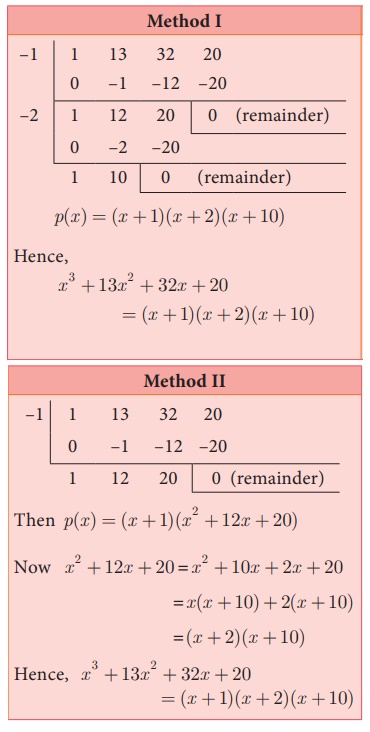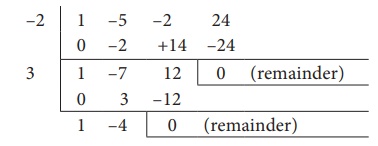Explanation, Example Solved Problems | Algebra | Maths - Factorisation using Synthetic Division | 9th Maths : UNIT 3 : Algebra
Chapter: 9th Maths : UNIT 3 : Algebra
Factorisation using Synthetic Division
Factorisation using Synthetic
Division
In this
section, we use the synthetic division method that helps to factorise a cubic polynomial
into linear factors. If we identify one linear factor of cubic polynomial p(x)
then using synthetic division we can get the quadratic factor of p(x).
Further if possible one can factorise the quadratic factor into linear factors.
Note
• For any non constant polynomial p(x), x = a is zero if and only if p(a) = 0
• x–a is a factor for p(x)
if and only if p(a) = 0 (Factor theorem)
To identify (x – 1) and (x + 1) are the factors of a polynomial
• (x–1) is a factor
of p(x) if and only if the sum of coefficients of p(x)
is 0.
• (x+1) is a factor
of p(x) if and only if the sum of the coefficients of even power of
x, including constant is equal to the sum of the coefficients of odd powers
of x
Example 3.38
(i)
Prove that (x -1) is a factor of x 3
−
7x2 +13x −7
(ii)
Prove that (x +1) is a factor of x 3
+
7x2 +13x +
7
Solution
(i)
Let p(x) = x 3 −7x
2 + 13x −7
Sum
of coefficients = 1 −7 + 13 −7 = 0
Thus
(x -1) is a factor of p(x)
(ii)
Let q(x) = x 3 +
7x 2 + 13x +
7
Sum
of coefficients of even powers of x and constant term = 7 + 7 = 14
Sum
of coefficients of odd powers of x = 1 + 13 = 14
Hence,
(x +1) is a factor of q(x)
Example 3.39
Factorise
x 3 + 13x2 +
32x + 20 into linear factors.
Solution
Let, p(x) = x 3 +13x 2 +
32x +
20
Sum
of all the coefficients = 1 +13 + 32 + 20 = 66 ≠ 0
Hence,
(x -1) is not a factor.
Sum
of coefficients of even powers and constant term = 13 + 20 = 33
Sum
of coefficients of odd powers = 1 + 32 = 33
Hence,
(x +1) is a factor of p(x)
Now
we use synthetic division to find the other factors

Example 3.40
Factorise
x 3 − 5x 2 −2x
+
24
Solution
Let
p(x ) = x 3 −5x
2 − 2x + 24
When
x = 1, p(1)= 1 −5 – 2 +24 =18 ≠ 0 (x -1)is not a factor.
When
x = –1, p(-1)= −1 – 5+2+24
=20≠0 (x +1) is not a factor.
Therefore,
we have to search for different values of x by trial and error method.
When
x = 2
p(2) = 23 −5(2)2 −
2(2) +
24
= 8−20−4+24
= 8 ≠ 0 Hence, (x-2) is not a
factor
When
x = − 2
p(-2)= (−2)3 − 5(−2)2 −
2(−2) +
24
= −8−20+4+24
p(-2) = 0
Hence,
(x+2) is a factor

Thus,
(x + 2)(x − 3)(x −
4) are the factors.
Therefore,
x 3 − 5x2 −2x
2 + 24 = (x +
2)(x − 3)(x − 4)
Note
Check whether 3 is a zero of x2 − 7x + 12 . If it is not, then check for –3 or 4 or –4 and so on.
Related Topics